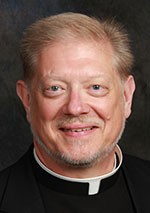That All May Be One / Fr. Rick Ginther
Snubs well worth the price of building unity among God’s people
 Have you ever been snubbed? If so, you know the pain it brings. You also know the negative emotions—anger, shame, bewilderment—which can ensue.
Have you ever been snubbed? If so, you know the pain it brings. You also know the negative emotions—anger, shame, bewilderment—which can ensue.
What if you came to bring good news and were snubbed by some, but welcomed by others? Would you not find yourself confused? Would you want to embrace those who welcome you and retaliate against the snubber?
There is a price to pay for ecumenical and interreligious relations. In Christ, the relations are eminently important. They may be joyous, they may be strained, they even may be cold. But a relationship can change over time. And so, we continue.
Pope Francis spent time in Bulgaria and Northern Macedonia this month. Stories, including a page 1 article in the May 10 issue of The Criterion, attest that he found a variety of welcomes.
Other media outlets shared, “[Pope] Francis … tried to use his trip to mend ties between the Catholic and Orthodox Churches, nearly 1,000 years after they formally split, but he did not appear to make much headway.
“On Sunday, he met … with the Bulgarian Orthodox leader, Patriarch Neophyte, [and spoke to him and the synod. He was greeted warmly by the patriarch]. But the Orthodox hierarchy ordered its priests not to worship with him, leaving Francis to pray alone in the St. Alexander Nevsky Cathedral in Sofia
“[Indeed,] a high-ranking figure in the Bulgarian Orthodox Church, Metropolitan Nikolai of Plovdiv, dismissed the pope’s visit as political and condemned in harsh terms his efforts to improve ties between the Churches,” said a story in the May 6 issue of The New York Times.
During his ecumenical and interreligious mission for the Church, the pope was not to be deterred from an official visit to the Catholic minority in both countries. He proclaimed the universal call to care for immigrants. He extended the peace of Christ to all—Orthodox, Muslims and other Christians.
During his audience at the Vatican on May 8, the pope recalled highlights of his visit.
“I renew my heartfelt gratitude to the civil authorities of both countries and to the respective Christian communities for their generous welcome,” he said. “In Bulgaria, guided by the example of Saint John XXIII, I invited everyone to walk in the path of fraternity.
“It was a joy to meet Patriarch Neophyte and the Holy Synod of the Bulgarian Orthodox Church, and I was also able to spend time in prayer before the throne of Saints Cyril and Methodius, two brothers who knew how to use their culture with creativity in proclaiming the Gospel. Today, too, we need such passionate missionary disciples.
“Finally, with representatives of different religions, we asked God for the gift of peace, while children carried burning torches: symbols of faith and hope.”
The Holy Father continued: “In North Macedonia, the spiritual presence of St. Mother Teresa of Calcutta accompanied me. We can see in this small yet strong woman an image of the Church in that land: a small community that becomes a welcoming home where many can find rest.
“After holy Mass, I met with priests and consecrated persons, as well as youths from different Christian denominations and other religions, encouraging them to listen to the Lord’s voice.”
This is the stuff of relationship building toward a good purpose: unity of Christians, unity based in human dignity and the search for God.
And they are well worth the price. And so, we continue.
(Father Rick Ginther is director of the archdiocesan Office of Ecumenism and Interreligious Affairs. He is pastor of Our Lady of Lourdes Parish, Indianapolis.) †
 Have you ever been snubbed? If so, you know the pain it brings. You also know the negative emotions—anger, shame, bewilderment—which can ensue.
Have you ever been snubbed? If so, you know the pain it brings. You also know the negative emotions—anger, shame, bewilderment—which can ensue.